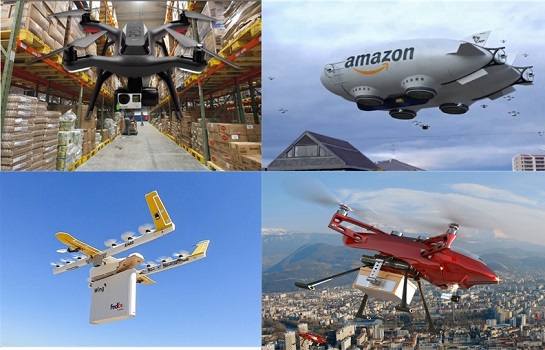
Views: 28
– More autonomous, greener, more complex, faster and more flexible: Researchers from the Fraunhofer Institute for Manufacturing Engineering and Automation IPA have investigated how Supply Chain Management will change by the year 2040 as part of a study conducted jointly with corporate consultancy Ginkgo Management Consulting.
Courtesy Fraunhofer IPA: The self-driving mother vehicle has found its way into the residential area and parks centrally. Drones unload it before delivering the packages. By 2040, this scenario may well have been part of everyday life for some time. Just as feasible is that by then, there could be a special pipeline system via which the “last mile” to the recipient can be covered for mailings. Such future scenarios arise from the necessity to get to grips with rising online orders and increased delivery traffic. A research team headed up by Martina Schiffer from the Department of Factory Planning and Production Management at Fraunhofer IPA together with Georg Pietrzak and his colleagues from Ginkgo Management Consulting have investigated how Supply Chain Management (SCM) is set to change by the year 2040 as part of a study. In addition to urbanization and digitization, they have identified a further eight megatrends that will impact value chains over the coming two decades.
Ten megatrends set to change value chains
Personalized products, demographic change, globalization, the growing demand from environmentally friendly and fair trade products, changes in mobility, concerns in connection with data security, the expanding service sector and the transition to a knowledge-based culture and information society: All of these global developments are set to play a role in ensuring that by 2040 SCM will
- be handled largely autonomously: Vehicles and machines will take care of load and unloading processes in harbors, freight depots and postal distribution centers before assuming responsibility for delivery. Sensors and self-learning algorithms will predict when wear and tear consumables are likely to malfunction or break down and order replacements in good time: humans will only have to plan and monitor these processes.
- curtail the environmental impact: Alternative drive trains will prevail and consumers will send decommissioned products back to the manufacturer, who then recycles this in order to produce a new product.
- no longer form a chain, but rather a network: the era of fixed value chains covering the raw material up to the finished product will finally be a thing of the past by 2040. In its place will come a fully digitized Smart Supply Chain, a complex network between all stakeholders. The number of people involved will be rising because of the increasing number of new goods and services being exchanged.
- be faster-moving: Companies will develop into significant players within a shorter space of time, although by the same token they can also disappear all the faster from the market.
- be more flexible: this means that SCM processes will be able to adjust more quickly to unforeseen events such as pandemics, wars and natural disasters.
The study is available for download
For their study, the research group headed up by Schiffer and the consultants at Ginkgo Management Consulting surveyed a total of 164 people across the entire value chain online – with a clear focus on manufacturers that do not sell their own products themselves. They then enriched the insights gained from this step in ten expert interviews with top-level managers and experts from leading companies and research institutes. This provided the research group with a basis from which they derived their visions of the supply chains of the future.
The study »SCM2040 – How will logistics change in the future?« is available to download from today free of charge. Fraunhofer IPA Supply Chain 2040
Related articles: Japan Airlines Sumitomo and Bell will develop the air mobility industry